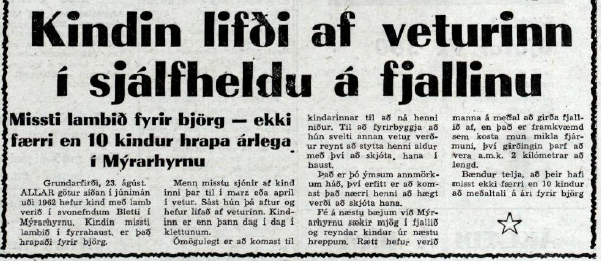Tags
I use news stories a lot in learning Icelandic, and one of the best resources for old news is Tímarit.is. I decided to see what was happening 50 years ago today in Morgunblaðið, and what is there right on page 24 (the best place for news :)) but a story about sheep. What was amazing is that it seemed so familiar. Just this past year were stories about sheep surviving months buried in snow, and here was a story from 50 years ago about a sheep that had survived all winter trapped on a mountain. This story is a bit sadder however, as there didn’t seem to be a way to save the sheep 🙁

Kindin lifði af veturinn í sjálfheldu á fjallinu
Sheep survives winter trapped on mountain
ALLAR götur síðan í júnímánuði 1962 hefur kind með lamb verið í svonefndum Bletti í Mýrarhyrnu. Kindin missti lambið í fyrrahaust, er það hrapaði fyrir björg.
Ever since June of 1962 a sheep with a lamb have been in the so-called Spot in Myrarhyrna. The sheep lost the lamb last autumn when it fell over a cliff.
I don’t think I’d seen the phrase allar götur síðan before, which seems to be a way to say ever since.
Menn misstu sjónir af kindinni þar til í marz eða apríl í vetur. Sást hún þá aftur og hefur lifað af veturinn. Kindinn er enn þann dag í dag í klettunum.
People lost sight of the sheep until March or April this winter. It was seen again and had survived the winter. The sheep is still on the cliff.
The verb að missa can take the genitive in a addition to the accusative. Here the phrase lose sight of is missa sjónir, but other places I see sjónar being used. I don’t know if it was just a typo or an indication of how the language has changed since then.
|
|
|||||||||||||||||||||||||||||||||||||||||||
Also note that March is spelled marz, with a ‘z’. This was before the spelling reforms in the early 70s. Personally I´m a fan of the ‘z’ 😉
Ómögulegt er að komast til kindarinnar til að ná henni niður. Til að fyrirbyggja að hún svelti annan vetur verður reynt að stytta henni aldur með því að skjóta hana í haust.
It is not possible to reach the sheep in order to bring it down. In order to prevent it from starving for another winter, it is necessary to put it down by shooting it this autumn.
The phrase að stytta henni aldur (literally to shorten its age/life) was an interesting construction, euphemistic just like to put down. I was also confused by skjóta hana í haust because haust (autumn) is so close to haus (head), I wasn’t sure if it could be a typo.
|
|
|||||||||||||||||||||||||||||||||||||||||||||||||
Það er þó ýmsum annmörkum háð, því erfitt er að komast það nærri henni að hægt verði að skjóta hana.
There are several problems however, since it is difficult to get close enough to the sheep in order to shoot it.
I found the adjective háður in the dictionary meaning dependent. It gives an example of it taking the dative case, which explains ýmsum annmörkum.
Fé á næstu bæjum við Mýrarhyrnu sækir mjög í fjallið og reyndar kindur úr næstu hreppum. Rætt hefur verið manna á meðal að girða fjallið af, en það er framkvæmd sem kosta mun mikla fjármuni, því girðingin þarf að vera a.m.k. 2 kílómetrar að lengd.
Sheep in the next farm at Myrahyrna graze a lot on the mountain, and even sheep from the next district. There have been discussions about fencing off the mountain, but that would be a very expensive undertaking, as the fence would need to be at least 2 kilometers long.
Here the abbreviation a.m.k means að minnsta kosti.
Bændur telja, að þeir hafi misst ekki færri en 10 kindur að meðaltali á ári fyrir björg.
Farmers estimate that they have lost no fewer than 10 sheep per year on average over the cliff.
sjálf·helda f tight corner, dilemma svo·nefndur adj so-called hrapa v fall down, plunge bjarg n rock, cliff klettur m rock, crag, cliff svelta v starve, allow to go hungry stytta v (acc) shorten, abbreviate ann·marki m drawback, flaw háður adj (dat) dependent hreppur m district fram·kvæmd f realization (of a plan)
